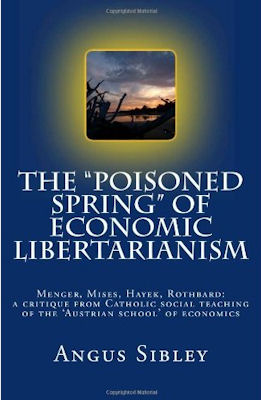
|
Posted July 15, 2012
Book: The "Poisoned Spring" of Economic Libertarianism Author: Angus Sibley Pax Romana. Washington, DC. 2012. pp. 214 An Excerpt from the Jacket:
He has long been concerned by the damaging effects on our economics and societies of the doctrinaire application of free-market theory. He has published many articles on this subject in newspapers and journals in Britain, America, France and Ireland. In this book he draws upon his professional experience and theological knowledge to show how "libertarian's economic theory and practice are radically challenged by Catholic teaching. Summarizing his argument he writes: "Capitalism is like the electric motor traditionally used in subway trains a very useful machine which has the peculiarity that it must never be allowed to run free when not connected to the wheels of a train. For without the restraint due to the train's inertia, the motor will accelerate wildly till its rotating center disintegrates. That does not mean that the motor is defective, it simply means that it only works properly under restraint. Likewise, our markets, when allowed to operate without an adequate framework of limitations, tend to run wild; they become financially, economically and socially destructive. Yet many economists, particularly those of the 'Austrian school', reject this principle. They call for deregulated, unhampered markets under minimal political control. By heeding these theories, we have got ourselves into deep trouble. It is important that we understand why this ideology; so wildly accepted, often subconsciously, is fundamentally flawed and particularly unsuited to the needs of our times." An Excerpt from the Book: Social Nature of the Human Person Catholic Social Teaching draws on far different philosophical and theological views of the human person [than does libertarianism]. Philosophically, the Catholic tradition has followed the position of Aristotle that the human person is "naturally social", and that human society itself is rooted in and constitutes an organic development of the family, although each larger social form beyond family (e.g., the village and later the city-state) has its own distinct social logic. That Greek tradition from Aristotle deepened with the Roman Stoics, who claimed that all human beings by nature to a single global social-ecological community, which they call "cosmopolis." This naturally social understanding of the human condition in classical European Catholic legal traditions and later found new strength with the Catholic Medieval Aristotelian renaissance led by Thomas Aquinas. From there flowed into the seeds of human rights and international law as developed by the early modern Catholic philosophical and theological school of Salamanca in Spain. Ultimately, it found mature modern expression in contemporary Catholic Social Teaching. Theologically, the Bible is our greatest witness to the social nature of the human person, and to the social responsibilities of the organic human social bond. A dramatically negative expression of this biblical doctrine may be found in the murderer Cain's notorious cry in Genesis 4:9: Am I my brother's keeper? A dramatically positive expression may be found in the Lord's decision to liberate the enslaved "children of Israel" (a family metaphor) from their oppression by the rulers of the Egyptian Empire - not as individuals, but as a people. This liberation is announced in Exodus 3:7-8: I have witnessed the affliction of my people in Egypt . . . Therefore, I have come down to rescue them. Lastly, the Compendium of the Social Doctrine of the Church, the most current authoritative expression of the Catholic social magisterium, clearly confirms this understanding of the human person when it boldly states: The human person is essentially a social being. This, of course, fits in with our everyday experience of family. The human being is born of the biological mixing of the DNA of a mother and father. The parents are in turn genetically indebted to their families of origin, including all prior generations of their families, all the way back to our human family's common evolutionary origin in Africa, and beyond that to all of biological evolution. So the child enters the world within the micro-society of the family, which is the first source of its social care, and the child is genetically part of a vast ecological network of extended family, which ultimately reaches to the entire human family and even deeper into the ancient roots of the planetary biosphere. In the extreme and tragic case of an abandoned baby who is not constantly touched in love (in effect, the closest real example to the false image of an "autonomous individual"), we sadly discover the pathological situation of the "non-bonded child." In such cases, unless there is extensive therapeutic intervention, the child will fail to develop an ethical conscience and typically, albeit tragically, such a child will grow up to a life of crime. So, since we are by nature social, the libertarian philosophy is grounded on the fundamental philosophical error about the very nature of the human person, and a dangerous one at that. The words of Austrian economist Friedrich von Hayek express this error in striking and memorable form: he claims that, in the free market, we rightly and properly "gain from not treating one another as neighbors." Table of Contents: 1. Return to Libertarianism 2. Disease of excessive individualism 3. Positive or negative freedom? 4. Background to Austrian economics 5. Founders of the Austrian School 6. Mises' intransigent individualism 7. Hayek, Apostle of negative freedom 8. Rothbard the anarcho-capitalist 9. Consequences of libertarianism 10. The virtuous republic 11. Libertarian Catholicism? 12. Is libertarianism a heresy? |
|
